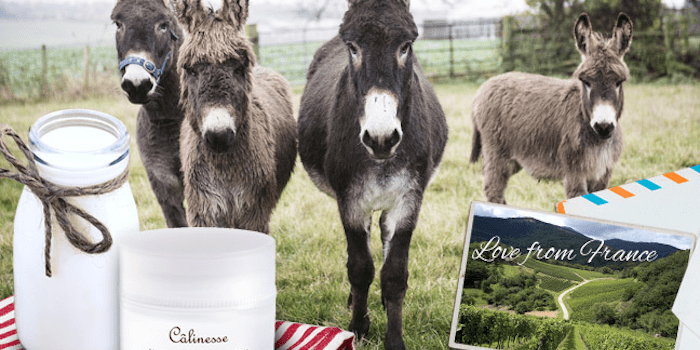Catherine Baron dit Faveron, founder of the French natural cosmetics brand Calinesse, came across the amazing properties of donkey’s milk quite by chance.“I was on vacation in the South of France in 2005 and staying at a small bed and breakfast, where the owners had put out soaps made with donkey’s milk by an artisanal soap maker in Marseilles for guests to use,” she recalls.
Baron used the soap without really thinking about it, but almost immediately, she noticed some very visible changes in the quality of her skin.“My face was very soft and felt very clean and not at all dry,” she says. “The soap was wonderfully rich and creamy and after using it just a couple of times, I felt such a significant difference in my skin.”
That difference is the reason why donkey’s milk was such a coveted substance through the ages, and why it was valued by kings, queens and ordinary people for its extraordinary health and beauty properties. Legend has it that Cleopatra, the great queen of Antiquity, favored bathing in donkey’s milk. The Greeks and the Romans believed it was a powerful elixir for health and strength, while the fashionable “Elegantes” of 19th Century France liked to dab it on their cheeks to soften and whiten their skin.
Donkey’s milk nourished many a French orphan, too, but after the advent of the industrial revolution, when machines replaced donkeys for pulling, ploughing and transporting, the animal that had once been ubiquitous in most of Europe and many other parts of the world faded into relative oblivion, its milk also more or less forgotten about and relegated to the realm of myth and folklore.Baron, however, was so taken up with the soap that she immediately went to meet the Marseilles soap maker, persuading him to supply her with his products. She first began selling the soaps made with donkey’s milk in Switzerland, where she lived at the time, and then in her native France.
Today, Calinesse offers a range of soaps, creams and lotions for both women and babies, all of which are made with donkey’s milk and have become incredibly popular both in Europe and in various countries across the globe. The number of artisan soap makers in France working with donkey’s milk has also increased, but Pierluigi Orunesu, founder of Swiss company Eurolactis—Calinesse’s main supplier of donkey’s milk and the only company in the world with a vertically integrated supply chain focused exclusively on the production of donkey’s milk—believes the donkey milk renaissance is only just beginning.
Orunesu, whose company owns around 910 donkeys and produces close to 60,000 liters of donkey milk per year, is at the forefront of a movement that not only extolls the extraordinary dietary and cosmetic properties of donkey’s milk, but also aims to raise the animal’s profile in modern day Europe.“I’m originally from Sardinia where there are tons of donkeys,” he says. “Donkeys are a part of tradition, but when we are small, we don’t understand the importance of the animal and all that we can do with it.”
Why Is Donkey’s Milk So Different?
Since he launched Eurolactis in 2007, Orunesu has learned a great deal about donkeys, including discovering that the milk is ideal for people with traditional milk allergies. Indeed, the casein/whey protein ratio in donkey’s milk compares very closely to human milk, which is what inspired Eurolactis to work on producing powdered donkey milk formula in Europe for babies and children with allergies to both dairy and soy milks. And earlier this year, the company took things a step further by using ultra-high temperature (UHT) technology to package liquid donkey milk in Tetrapaks.Additionaly, donkey’s milk has a low omega-6/omega-3 ratio, making it anti-inflammatory (most American diets are overloaded with omega-6 compared to omega-3, which creates disease-inducing inflammatory conditions in the body).
Vitamins Galore
Donkey’s milk possesses large amounts of the anti-bacterial enzyme Lysozyme, and it also contains a high amount of polyunsaturated fatty acids, which are excellent for maintaining skin’s moisture barrier.“The milk also contains many vitamins and minerals, including Vitamin A for the cellular membrane, Vitamin B2, which is excellent for immunity and the biological processes of the skin, and Vitamin E, which stops the aging process,” Orunesu says. He also explains that it has more Vitamin C than cow’s milk, so it is a great antioxidant. “This milk really hydrates the epidermis, nourishes and regenerates the skin tissue,” he continues.Because donkey’s milk is so creamy—and that creaminess comes from its high sugar content—it lends itself extremely well to cosmetic formulae, Baron says.
Although the number of people working with donkey’s milk is still small, the industry is steadily growing, and more artisans like St. Gervais les Bains and France-based Estelle Tuaz-Torchon are working with it in different ways.Tuaz-Torchon and her husband have always been passionate about donkeys, she says, and though they do make a number of different kinds of soaps by mixing donkey’s milk with natural products like green clay, carrot oil, chamomile and wheat germ, their overall love for the animal guides everything they do.“Our idea is to work around the donkey and we have a more holistic approach,” Tuaz-Torchon says. “We don’t do only soaps, we also take kids on donkey rides, we do walks in the Mont-Blanc region, we take families out on picnics and so on and as we do this, we educate people on the richness of the donkey and its importance both in history and today.”




































